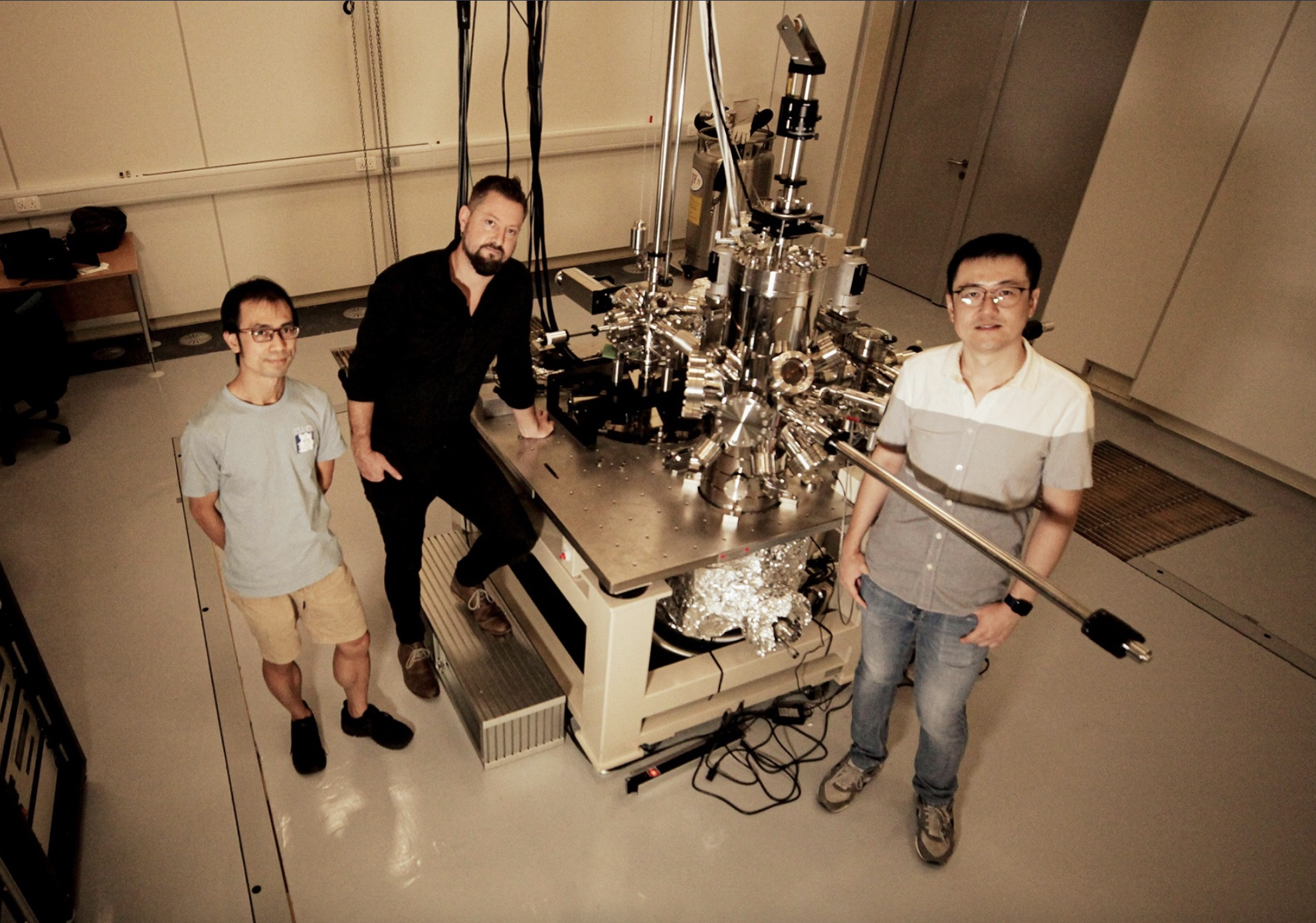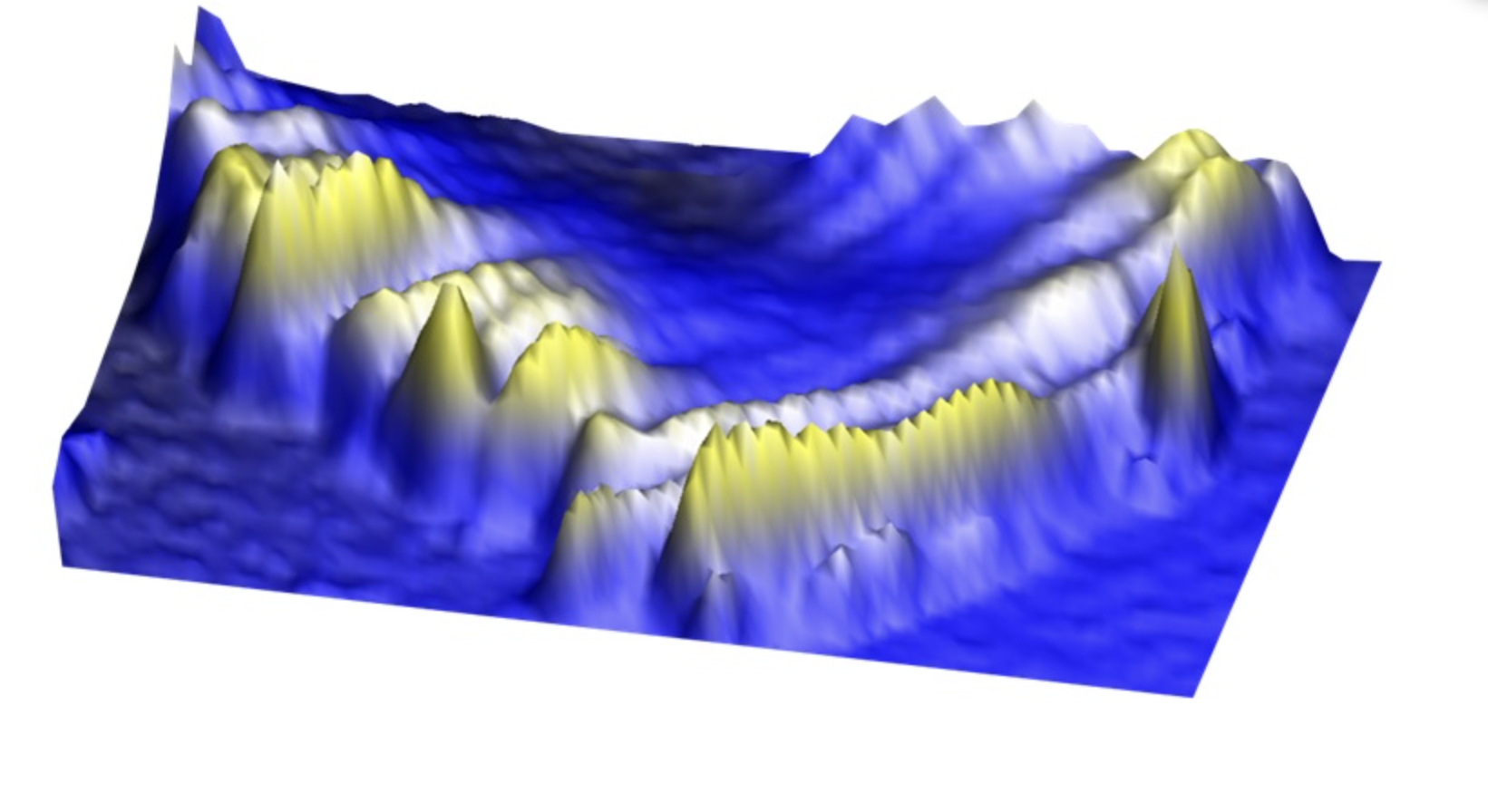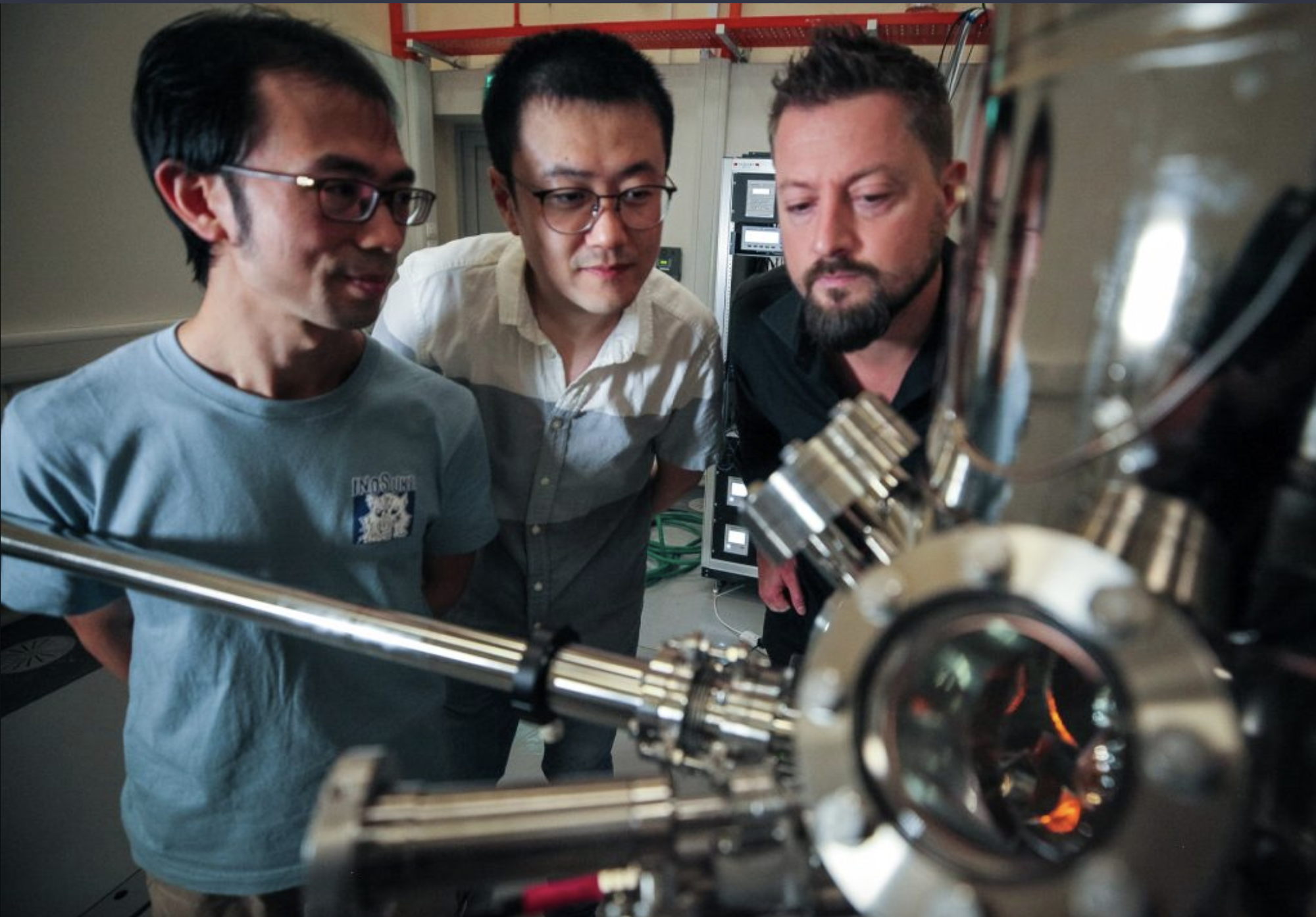Quantum Computing May be Bolstered by Liquid-Like Electrons
Another day, another exciting advancement for quantum computing.
The quantum computing field may have just received a coherence and error-prevention boost in the form of parafermions: grouped electrons that behave as liquids in a special state of matter. Scientists with the Nanyang Technological University in Singapore have demonstrated experimental results they expect to lead to parafermions when electrons maintain temperatures close to absolute zero (-273 degrees Celsius). The research achieved a breakthrough by demonstrating that there are conditions in which electrons can have strong interactions – something that scientists merely theorized until now.
The ordered movement of electrons results in what we know as electricity. However, even when electrons are moving in this “ordered” pattern, they’re actually not. Because they’re negatively charged, electrons repel one another, tending to move individually and haphazardly in different directions (like a gas) instead of as a cohesive whole. They’re akin to impaired drivers: they may reach their destination with a few “bumps” along the way. But when electrons behave like a liquid, it’s akin to swapping the impaired drivers with orderly ones; drivers that know and respect each other’s boundaries, speed and direction to reduce conflicts and better reach their destination.
Of course, drivers such as these are the subject of much theoretical thought, but the strong electron interactions at least have now been experimentally proven to exist.
When electrons are made to act in what’s known as a “helical Tomonaga-Luttinger liquid,” there are fewer particle interactions and energy exchange between them and the system. This, in turn, decreases the amount of systemic and environmental interference that’s so often the cause of errors and collapsed quantum states in quantum systems. The electrons being previously cooled to near absolute zero is also an essential element, as it allows certain materials to achieve the state of a superconductor, where electrons traverse its surface absent of any electrical resistance, further reducing the possible elements of environmental interference. The system being cooled to absolute zero (in the experiment, down to 4.5 Kelvin or -269 degrees Celsius) forces particles to slow down so that they almost become immobile.

Electrons (and their spin property) have been used as quantum-programmable particles for a while now. As such, improvements in electron control that lead to fewer disturbances mean fewer errors and improved coherence, which means longer life for the actual qubits that can store or process information. In fact, certain quantum systems (such as IBM’s Quantum One and Quantum Two) already make use of superconducting qubits.
In this case, scientists used an atom-thick graphene substrate where they deposited atom-thick crystals of tungsten ditelluride: an almost two-dimensional material known as a “quantum spin Hall insulator,” which insulates gravity on its inside but features electrons on the outside. After putting together the graphene/tungsten ditelluride substrate and cooling it towards absolute zero, the research team put it under a scanning tunneling microscope that lay just one nanometer from its surface: smaller than a DNA strand and smaller than any transistor ever manufactured (even when looking at the ones powering the latest best graphics cards).

When put under the scanning tunneling microscope and cooled to absolute zero, the researchers noticed the electrons in the graphene/tungsten substrate increased their repulsion. Their repulsion was so strong that the electrons were forced to move collectively due to the interaction between each electron’s repulsion field. The researchers registered a Luttinger parameter within a range of 0.21 to 0.33. This parameter represents the strength of the interactions between particles; when it reaches 1, the interactions are at their weakest.
Get Tom's Hardware's best news and in-depth reviews, straight to your inbox.
“When the Luttinger parameter is less than 0.5, the interactions are strong and the electrons are forced into collective motion. This is the realm where parafermions are predicted to exist,” said Assistant Prof Weber. “This is a truly remarkable range of variation, since the Luttinger parameter can only range between 0 and 1,” he continued. “Control of the Luttinger parameter at such low values has never been observed before in any helical Tomonaga-Luttinger liquid.”

The team is now planning to reduce temperatures even further by leveraging NTU Singapore’s new Ultra-Low Vibration Laboratory, which was built earlier this year. The laboratory will allow experiments to be done at even lower temperatures of 150 millikelvins (mK) – even closer to absolute zero, which should enable the researchers to see stronger repulsion amongst electrons and the actual witnessing of parafermion groupings.
Interestingly, it seems that the researchers’ approach is somewhat connected with Microsoft’s own race to implement so-called topological qubits and their required (and still missing in action) Majorana modes.

Francisco Pires is a freelance news writer for Tom's Hardware with a soft side for quantum computing.
-
bit_user Reply
They have to work at a useful scale, before you can worry too much about cost reductions. And we're still wrestling with that scaling problem.George³ said:I see more increase of costs. This is not way to make quantum computers popular.
Do you complain that supercomputers are too expensive? QC holds the potential to be vastly more powerful, at certain kinds of problems. So, even if it remains as expensive and impractical as supercomputers, that wouldn't actually be a deal-breaker. Especially in the era of cloud computing, where it matters less than ever where the computers are physically located, and you can rent time on one instead of having to buy it outright. -
George³ So far I have not learned of any fundamental benefit since supercomputers have existed. All important things were discovered or invented before supercomputers existed, or before they had meaningfully high parameters. Using the good old human brain as creator and as tool. Of course, besides the supercomputers themselves, there is money and jobs. I really wish they had paid off, though, not in bloody cash, but in a way that was actually beneficial to our species as a whole. So far I don't think there is a payout. Please don't show me figures, invoices and budget tables. I can't be convinced like that.Reply -
bit_user Reply
So, you're essentially claiming that the advancement human scientific knowledge ended in the 1960's? That's absurdly and demonstrably wrong.George³ said:So far I have not learned of any fundamental benefit since supercomputers have existed. All important things were discovered or invented before supercomputers existed, or before they had meaningfully high parameters.
I don't have a detailed list, but I know that supercomputers are used to process the vast quantities of data collected by particle accelerators, telescope arrays, weather data, not to mention solving problems related to materials science, genomics research, and drug development. I'm sure there's not an area of scientific knowledge that hasn't been touched by them. I once worked for a pioneer in the field of plate tectonics who stumbled into the field of supercomputing, in order to prove this theory of our planet that we now take for granted.
I hate to sling this term around, but you know there's a name for when someone with little knowledge of a field of expertise underestimates the size and depth of that field: Dunning–Kruger effect. Prescription: a dose of humility and try to be inquisitive whenever you're inclined to be dismissive.
The human brain has well-known cognitive biases and limitations. Data science and computational simulations are essential tools for surpassing these.George³ said:Using the good old human brain as creator and as tool. -
George³ All of the above is true. And what? I still can't buy a ticket to Mars. Actually I can, but then I'm not sure if I'll live to use it. People still die of cancer, cars still roll on wheels invented millennia ago. There are still no reliable predictions of earthquakes. In fact, there are no exact predictions for anything slightly more complicated than the algebraic addition of two numbers.Reply
Where's my antigravity? So many petaflops and now exaflops and nothing! :) -
bit_user Reply
You're saying that, because we haven't arrived at certain arbitrary milestones, we have made no progress at all? That's a flawed argument, and the computer you're typing it on proves it.George³ said:All of the above is true. And what? I still can't buy a ticket to Mars. Actually I can, but then I'm not sure if I'll live to use it. People still die of cancer, cars still roll on wheels invented millennia ago.
We can go through these milestones, one by one, look at what progress has been achieved and why they're hard problems. However, I think it would be a pointless exercise, as you don't seem to be making a sincere attempt to understand the contributions and role of supercomputing in these & other fields.George³ said:There are still no reliable predictions of earthquakes.
I can't make you change your mind. My role is only to challenge your assumptions. The information is out there, if you seek it.
Meanwhile, the miracle of modern civilization is that people will continue to toil away in research institutions, furthering our understanding of particle physics and material science that enables ever faster CPUs and GPUs to be fabricated, which you can buy and use while remaining oblivious to this fact. Even car and airplane engines owe their past several decades of efficiency improvements largely to sophisticated simulations. The oil & gas sector is another example of one that has made extensive use of HPC.
BTW, we're off track from QC. If you want to understand the value proposition of QC, much has been written about the classes of problems where it excels. -
George³ I would appreciate it if you would never use medical terms in the role of arguments again. Yes, I expect much more from these items, in which there are extremely large public investments from the state budgets of various countries.Reply -
bit_user Reply
You haven't demonstrated any knowledge or even curiosity about what has been achieved, using them. So, I think the bar you've set is basically impossible ever to be cleared.George³ said:Yes, I expect much more from these items, in which there are extremely large public investments from the state budgets of various countries.
I'm not about to spoon-feed you what you don't seem to want to know. The information is out there, but nobody is going to cram it down your throat (which, ironically, is what I think you're somehow waiting for). -
Systemsincode Good article can you cover the ms approach and some of the other quantum computing subjects, perhaps some first principals for us newbies?Reply -
bit_user Reply
Here's a good intro article:Systemsincode said:Good article can you cover the ms approach and some of the other quantum computing subjects, perhaps some first principals for us newbies?
https://www.tomshardware.com/features/what-is-quantum-computing
You can find more, here:
https://www.tomshardware.com/search?searchTerm=quantum